I learn about JPA and had task to make database and insert some values to it. I wondered how I can find out what was the ID of recently inserted object, so I found a way that I need to use flush method of EntityManager.
Unfortunately I got the
Null or zero primary key encountered in unit of work clone
exception when I use the above method. I think the problem lies in that my database has all ID's set on autoincrement ( I use ORACLE 11G Express ), so before commiting it has null value and it rollbacks transaction.
What I can do to fix it ?
This is DB ( ID's are autoincrement[Sequences and Triggers in oracle]):

public class Client {
public static void main(String[] args) {
EntityManagerFactory emf =
Persistence.createEntityManagerFactory("JpaIntroductionPU");
EntityManager em = emf.createEntityManager();
EntityTransaction et = em.getTransaction();
et.begin();
Address ad1 = new Address();
ad1.setStreet("Skaraktki");
ad1.setCode("64-340");
em.persist(ad1);
em.flush();
System.out.println(ad1.getAId());
et.commit();
}
}
Address class
@Entity
@Table(name = "ADDRESS")
@NamedQueries({
@NamedQuery(name = "Address.findAll", query = "SELECT a FROM Address a"),
@NamedQuery(name = "Address.findByAId", query = "SELECT a FROM Address a WHERE a.aId = :aId"),
@NamedQuery(name = "Address.findByStreet", query = "SELECT a FROM Address a WHERE a.street = :street"),
@NamedQuery(name = "Address.findByCode", query = "SELECT a FROM Address a WHERE a.code = :code")})
public class Address implements Serializable {
private static final long serialVersionUID = 1L;
// @Max(value=?) @Min(value=?)//if you know range of your decimal fields consider using these annotations to enforce field validation
@Id
@Basic(optional = false)
@Column(name = "A_ID")
private BigDecimal aId;
@Basic(optional = false)
@Column(name = "STREET")
private String street;
@Basic(optional = false)
@Column(name = "CODE")
private String code;
@OneToOne(cascade = CascadeType.ALL, mappedBy = "aId")
private Employee employee;
@OneToOne(cascade = CascadeType.ALL, mappedBy = "aId")
private Department department;
public Address() {
}
public Address(BigDecimal aId) {
this.aId = aId;
}
public Address(BigDecimal aId, String street, String code) {
this.aId = aId;
this.street = street;
this.code = code;
}
public BigDecimal getAId() {
return aId;
}
public void setAId(BigDecimal aId) {
this.aId = aId;
}
public String getStreet() {
return street;
}
public void setStreet(String street) {
this.street = street;
}
public String getCode() {
return code;
}
public void setCode(String code) {
this.code = code;
}
public Employee getEmployee() {
return employee;
}
public void setEmployee(Employee employee) {
this.employee = employee;
}
public Department getDepartment() {
return department;
}
public void setDepartment(Department department) {
this.department = department;
}
@Override
public int hashCode() {
int hash = 0;
hash += (aId != null ? aId.hashCode() : 0);
return hash;
}
@Override
public boolean equals(Object object) {
// TODO: Warning - this method won't work in the case the id fields are not set
if (!(object instanceof Address)) {
return false;
}
Address other = (Address) object;
if ((this.aId == null && other.aId != null) || (this.aId != null && !this.aId.equals(other.aId))) {
return false;
}
return true;
}
@Override
public String toString() {
return "jpaintroduction.Address[ aId=" + aId + " ]";
}
}